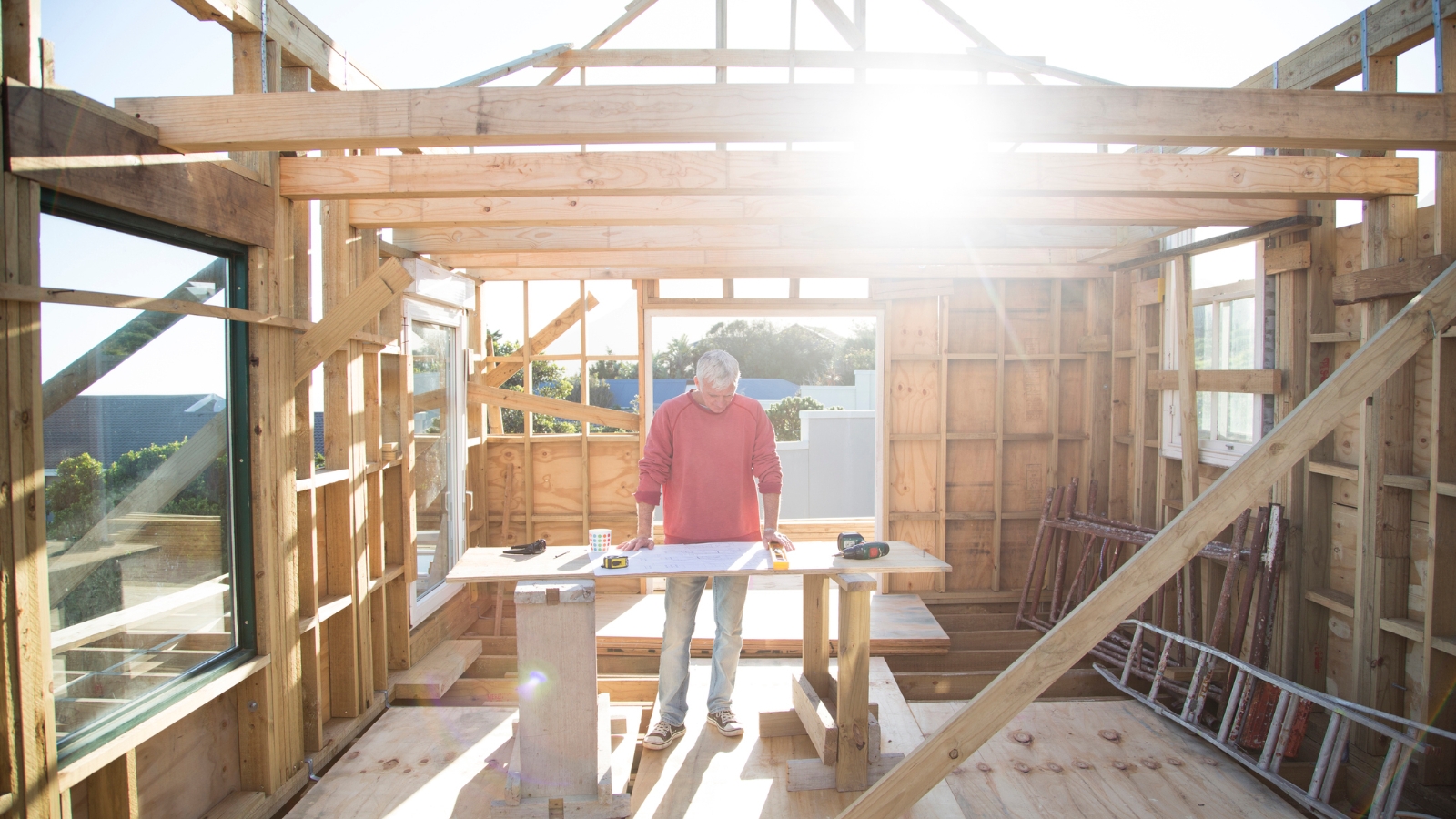Buying guide
NZ Construction loans: Everything you need to know (2024)
The Trade Me Property guide to financing your next build
Last updated: 8 August 2024
Step one of construction isn’t laying foundations - it’s getting finance. So if you’re planning on building a home in the near future it’s a good idea to start talking to lenders and mortgage brokers months in advance.
To help you get started we’ve put together a definitive guide to NZ construction loans.
How much deposit do I need for a construction loan?
First thing’s first. The size of the deposit you’ll need depends on a few factors and can vary between lenders:
It’s a good idea to aim for a deposit equal to at least 10% of the construction and land costs.
With that said, you may be able to secure a construction loan with as little as 5% (but you may be charged extra if you do).
Generally the higher your deposit, the more likely you are to be approved.
For example: The average new build cost $442,132 in 2023, according to Canstar. If you were to build the average home on a piece of land worth $500,000, then you’d be spending a total of $992,132. A 10% deposit on that amount equals $99,213.
How do construction loans work?
Construction loans usually work a little differently to your everyday home loan at first. Here are the basics:
You’ll draw down (increase the balance) of your construction loan in stages as the build progresses.
These progress payments will usually happen after agreed upon stages of work are completed and the builder sends an invoice.
The lender will generally pay your builder directly.
Your loan may be at a variable rate while construction is progressing. These are usually a bit higher than fixed interest rates.
To keep costs down you may be able to either make zero repayments during the construction period or pay interest only.
Once the construction is completed you can lock in a lower fixed interest rate.
Keep in mind that if you pay interest only or delay payments you’ll pay more interest in the long run as your loan principal will not decrease during the construction period.
How to apply for a construction loan
Your lender should be the first person you talk to when you decide that you want to build. Before you spend a dollar they’ll be able to tell you roughly how much you can spend based on your income, expenses and other serviceability criteria. They’ll also tell you what the next steps are.
Then, when you’re ready to get formal approval for a construction loan you’ll need to show your lender:
A sale and purchase agreement for the land you intend to build on (if you don’t already own it).
A draft contract with a qualified and licensed builder, subject to lender approval.
Any building or resource consents required.
A registered valuer’s report detailing the estimated value of the property once construction is complete.
To apply head to your chosen lender’s website and either complete an online application, or contact them directly. Or if you’d like some impartial advice and help shopping around lenders, speak to a mortgage broker who specialises in construction loans.
You won't get far without finance.
How much can I borrow with a construction loan?
Construction loans are assessed similarly to regular loans with a few extra variables. The lender will still look at your income and expenses, as well as the stability of your employment and the way that you manage your money. They’ll consider your level of debt and your ability to afford loan repayments.
What’s different about construction loans is that the lender will also consider the potential completed value of your new home build. They will not lend more than the possible future value, minus your deposit amount.
That means to secure finance on a new build you might need a professional valuation. This means to ensure you can secure finance, it's important to buy land at a good price and secure a competitive price for your build.
A closer look at construction loan progress payments
You and your lender will usually pay your builder in the following stages as work progresses:
Site works, permits and consultation fees.
Framing and roof up.
Internal lining, doors, windows, plumbing and electrical.
Fit out and finish, including kitchens, bathrooms, interior paint and flooring.
Final payment upon issue of the Code of Compliance Certificate.
Importantly the costs at each stage will need to be agreed prior to your bank approving finance.
Types of construction contracts
If you want to finance a build your lender will require a construction contract. It’s a good idea to hire an experienced lawyer right away to check your contract and explain any details before you sign on the dotted line.
With that said, generally there are two types of contract to consider:
1. Turn key
A turn key contract covers all you’ll need to complete your new home - including everything from a piece of land to framing, flooring and fittings. They’re usually offered by large construction or development companies as part of developments or new subdivisions. If you want a low hassle, easy to finance build, this may be your best option.
Pros
Price certainty. This is as close to a truly fixed price contract as you’ll get.
Lower deposit requirements. Because these types of contracts offer price certainty and are usually offered by well known builders, banks may require a smaller deposit.
You won’t need a loan until the build is finished. This could save you thousands in interest and repayments.
Cons
Choice may be limited in terms of the type of home available and locations.
These contracts may be less flexible allowing for a less customised building
2. Build-only
If you buy your land separately and choose your own builder to build your home, you’ll need a build-only contract. You could choose from a construction company’s standard plans, or have an architect design a custom home. This option will generally mean you can be more flexible with your building, but it may involve more complexity.
Labour-only VS fixed price
With build-only contracts there are generally two types of contract to consider:
With a fixed price contract the total cost of the build is agreed upon in advance, with invoices to be paid at certain stages of the build. Fixed price contracts are almost never truly fixed - there’s usually a sum put aside for cost overruns.
Labour-only contracts don’t include a fixed price - instead the loan approval will be based on quotes from all the different trades.. Work is paid for as you go, and you’ll usually project manage the build yourself or use a building company to look after a number of subcontractors. If you’re going for a labour-only contract, it’s a good idea to make sure you hire an experienced builder to project manage (unless you’re confident and experienced).
Pros
Your build may be more flexible, compared to most turnkey contracts.
You may have more options when it comes to choosing a section.
There may be more opportunity to add value to the land and make an instant capital gain once construction is complete.
Cons
You’ll need to make progress payments and pay interest on your construction loan and land right away.
There may be less price certainty than with turnkey contracts. Especially if you choose the labour-only option.
The right loan can make building much easier.
A note on provisional costs (PCs)
Before your build begins you may not have decided on every detail - stuff like kitchen taps, flooring and the type of tiles you’ll use in your bathrooms. There may also be other costs you’re not aware of yet - for example, Earthworks might cost more or less than expected, depending on the quality of the sub-soil.
You and your builder will agree to not fix the price of certain parts of your build contract to account for these variations. For example, your PC costs might include a budget for a certain specification of kitchen taps and sinks. If you choose a higher specification, then you might have to pay extra.
If your project cost ends up blowing out, chances are the price increases will come via provisional sums. Builders may set these unrealistically low so they can offer an attractive price, only for costs to blow out later in the build when these sums aren’t sufficient. To avoid these it’s important to go through PC costs line by line with your builder to ensure you understand what’s included. It’s also a good idea to check that all estimates are as accurate as possible.
Don’t be afraid to get a second opinion from another builder or quantity surveyor to make sure your PC sums stack up.
Finding the right construction loan
Building a home is expensive - one of the best ways to make it cheaper is to find a construction loan with a competitive interest rate that’s suited to you. Here are a few tips to make your search easier:
Look at all your options: don’t go right to your bank because it’s easy. Look at all available options to find the most competitive interest rate and favourable terms.
Use a mortgage broker: a good broker can help you shop around and provide impartial advice. They may also be able to access better rates.
Overestimate your costs: these days it seems like every build goes over budget. Make sure you have pre-approval to borrow at least 10% more than the projected cost of your project rather than risk running out of money and not being able to finish.
Last but not least you should think about costs during your build. Your build could take up to two years, during which time you might be making payments on a construction loan, plus repayments on your current mortgage or rent. If there’s no way around paying double housing costs, speak to your lender about how they might help you manage that.
DISCLAIMER: The information contained in this article is general in nature. While facts have been checked, the article does not constitute an advice service. The article is only intended to provide general information about construction loans in New Zealand. Nothing in this article constitutes a recommendation that any service or financial product is suitable for any specific person. We cannot assess anything about your personal circumstances, your finances, or your goals and objectives, all of which are unique to you. Before making decisions, we highly recommend you seek professional advice.
Author
Other articles you might like


-fotor-2024080816437.jpg)
